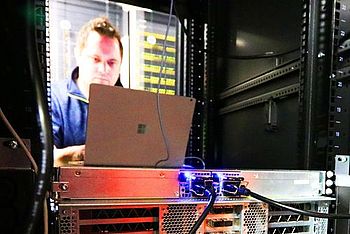
New Computer Architecture Accelerates Dementia Research Insights

IT technician at the DZNE’s computing center. Source: DZNE
Time is running out: Dementias such as Alzheimer's disease are already one of the biggest challenges in medicine today. The problem will increase due to the growing elderly population.
New approaches to prevention and therapy could result from the analysis of genomic and brain imaging data.
But their evaluation requires enormous computing power. Therefore, the DZNE and Hewlett Packard Enterprise (HPE) have started a collaboration to realize the potential of Memory-Driven Computing for medical research.
The DZNE is the first institute in the world to use this radically new computer architecture for biomedical research.
Following a joint feasibility study, DZNE and HPE now take the next step: The new high-performance computer “HPE Superdome Flex” has just been put into operation at the DZNE’s computing center in Bonn.
So far, the DZNE scientists had tested their algorithms on HPE computers in the USA. Already with that, it was possible to shorten the time of a genomic computing process from 22 minutes to 13 seconds.
Now the Bonn researchers have their own system available.
https://www.dzne.de/en/news/public-relations/press-releases/press/detail/new-com… Complete press release












